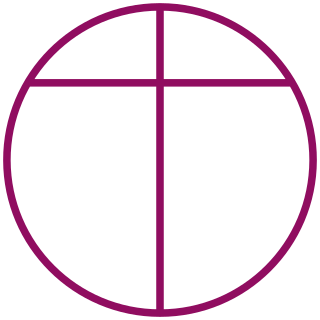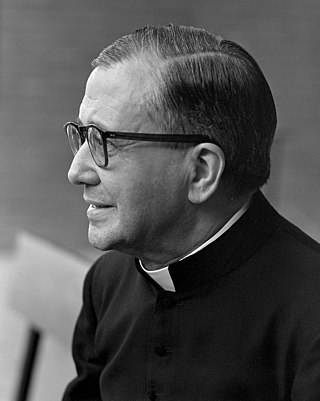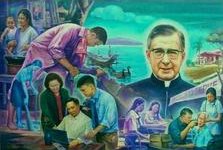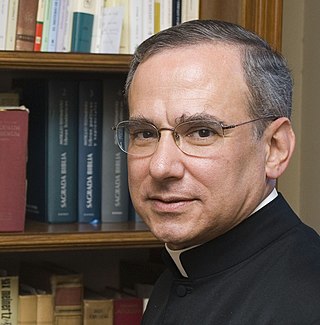
Opus Dei, formally known as the Prelature of the Holy Cross and Opus Dei, is an institution of the Catholic Church whose members seek personal Christian holiness and strive to imbue their work and society with Christian principles.

Josemaría Escrivá de Balaguer y Albás was a Spanish Roman Catholic priest. He founded Opus Dei, an organization of laypeople and priests dedicated to the teaching that everyone is called to holiness by God and that ordinary life can result in sanctity. He was canonized in 2002 by Pope John Paul II, who declared Josemaría should be "counted among the great witnesses of Christianity."

Álvaro del Portillo y Diez de Sollano was a Spanish engineer and Roman Catholic bishop. He served as the prelate of Opus Dei between 1982 and 1994 as the successor to Josemaría Escrivá.

The University of Navarra is a private research university located on the southeast border of Pamplona, Spain. It was founded in 1952 by St. Josemaría Escrivá de Balaguer, the founder of Opus Dei, as a corporate work of the apostolate of Opus Dei. The University of Navarra has consistently been ranked as the best private university in Spain. In 2021, the university's School of Law was ranked best in Spain and 44th in the world by Times Higher Education's international rankings.

Javier Echevarría Rodríguez was a Spanish bishop of the Roman Catholic Church. Until his death, he was the head of the Prelature of the Holy Cross and Opus Dei. He held doctorates in both civil and canon law.
Opus Dei and politics is a discussion on Opus Dei's view on politics, its role in politics and its members involvement in politics.
Opus Dei: A Historical Timeline shows the historical development of Opus Dei.
Opus Dei and Catholic Church Leaders discusses the comments and observations of popes, cardinals, and other leaders of the Catholic Church as regards the Personal Prelature of the Holy Cross and Opus Dei.
This is a bibliography of works about Opus Dei, also known as the Prelature of the Holy Cross and Opus Dei, which was founded by Josemaría Escrivá.

Teachings of Opus Dei are the teachings of the founder of Opus Dei, St. Josemaría Escrivá de Balaguer.
Opus Dei in society refers to the social mission, general social strategy, social activities, work, relationship with politics and other aspects of Opus Dei.

The Priestly Society of the Holy Cross is an association of Catholic diocesan priests which is integrally united to the Prelature of Opus Dei.
Opus Dei is a personal prelature within the Roman Church that has been the subject of numerous controversies. Throughout its history, Opus Dei has been criticized by many, including by numerary members who knew the founder and had roles in Opus Dei's internal government. The reports by former members in the USA, England, Spain, Latin America, France, Germany, and other countries are published. Journalists have described it as "the most controversial force in the Catholic Church" and its founder Josemaría Escrivá as a "polarizing" figure.

Fernando Ocáriz Braña is a priest of the Catholic Church who has been the prelate of Opus Dei since 2017. Ocáriz is the fourth person to head Opus Dei since its founding in 1928. He is widely published in philosophy and has been a consultor of the Congregation for the Doctrine of the Faith since 1986.
Enrique Colom Costa is a Spanish-born naturalised Chilean Catholic priest and theologian.

Dora del Hoyo Alonso, was one of the first women members of Opus Dei. A domestic worker by profession, del Hoyo was the first to join the Prelature of Opus Dei as an assistant numerary meaning that she dedicated herself professionally to caring for people and looking after the material needs of Opus Dei centers. From 1946 until her death, she lived in Rome, Italy where she collaborated first with Josemaría Escrivá de Balaguer, Opus Dei's founder, and later on with his successors Álvaro del Portillo and Bishop Javier Echevarría, in the domestic management of the first Opus Dei center there, later the movement's headquarters. Her process of canonization was opened in Rome on June 18, 2012 by Echevarría, at the request of many who knew and worked with her. Her mortal remains lie close to the tomb of Escriva, in the crypt of Our Lady of Peace Church in Rome.

Francisco Javier López Díaz is a Spanish theologian and a priest of the Catholic Church incardinated in the personal prelature of Opus Dei. He currently teaches at the Pontifical University of the Holy Cross in Rome.
José Marroquín Yerovi was an Ecuadorian priest.










